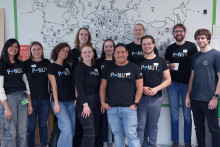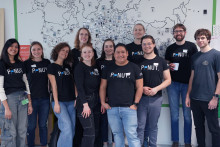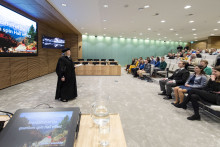What was your first reaction to the open letter? Do you share the concerns expressed by PNN?
Mario Boot (Secretary of the P-NUT board): ‘We definitely agree that things are not going the right way. Our concern, however, isn’t necessarily with the new minister, but mostly with the plans of the new government. The letter raises two main issues: the high work pressure among young researchers and the topic of internationalization. There are already big problems in these areas, and they will only get worse if the plans of the government get implemented.’
Do you think it’s important that PNN has sent the letter?
‘It’s good to make ourselves be heard. What PNN wrote about also relates to the UT and it’s good to raise awareness of the situation. On one hand, we need more knowledge and technology to battle grand challenges of the world, such as climate change, but on the other hand the government is cutting the budget for academia – which is unfair and creates a lot of stress.’
PNN Open letter
Promovendi Netwerk Nederland (PNN) is the national interest organization for and by PhD candidates. They have sent out this open letter to Dr. Bruins, future Minister of Education, Culture, and Science, sharing their worries about the future of young academics – and the future of science in general. In the letter, PNN warns that further budget cuts to Dutch academia would have serious consequences for early-career researchers and worsen the current situation which is already ‘marked by extremely high workloads, burnouts, social unsafety, competition, and inequality of opportunities.’
The letter mentions ‘sky-high workloads’ among young researchers. Is this something you recognize from your experience at the UT?
‘Definitely. High workload is something we recognize – we are PhDs ourselves and we also receive signals from other young researchers at the UT. Especially the onboarding and the second half of the doctoral trajectory is very hard. This is partly by design because doctoral candidates are educated to become leaders in their fields. They need to show they are outstanding researchers, which by definition is a challenging position.
But the high work pressure is also due to bad policies, bad management and bad supervisors who make our lives miserable. People who end up in leadership positions are not always suited for it. Professors are often evaluated based on the amount of grants they bring in, not their leadership skills. They might be excellent researchers, but they might not be able to emphasize with younger staff, for example.’
How do you aim to contribute to tackling these challenges as P-NUT?
‘We have advised on new Supervision Guidelines which will be available soon. This is a set of recommendations given by the Twente Graduate School to all doctoral supervisors at the UT.
The UT Executive Board has also formally invited P-NUT to participate in meetings focused on revising the criteria for promotion rights. As you might know, promotion rights are now only given to full professors, and not necessarily the daily supervisors of the doctoral candidate. We’d like to help change the criteria so that the person with the rights is more likely to be a good supervisor. I think this could have a big impact on the lives of young researchers.
For the rest, it is unfortunately not in our control. We cannot influence the national debate in The Hague, but we certainly stay in touch with PNN which has good connections with political parties.’
Internationalization is also specifically mentioned in the letter – and has been a topic of discussion at the UT. How do you view this issue? Have you received signals from international PhDs at the UT, indicating that they ‘experience discrimination and racism, being excluded from conversations, education and research’?
‘Yes, that is something that happens here. One example is the Dutch language discussion. Another one is the fact that doctoral candidates on external scholarships don’t join participatory bodies at the UT because they cannot be compensated. This means we miss their voices. This way, the system is silencing their voices.
I understand that the topic of internationalization is a big dilemma for the government. On one hand, the world is globalizing but on the other hand there is a big shortage of people with practical skills in many Western countries. We need more science and knowledge to solve the problems of tomorrow, but we also need plumbers, electricians, bakers… However, we already see student registration numbers dropping, especially among international students. They are discouraged by the plans of the government. This is not good because we need a diverse population and interdisciplinary research.’
Do you think there is anything that P-NUT or the UT can do to improve the situation?
‘As P-NUT, we believe it’s important to welcome international colleagues. We have started a buddy system for new internationals arriving at the UT, because we have received signals that they often feel lonely and struggle to find their way. Now each new international PhD or PDEng is invited to couple with a more experienced buddy to give them advice and guidance. There is a handbook for international students. It is now being updated and will be distributed to all new doctoral candidates. By being more welcoming and accommodating, we hope to counterbalance the unfortunate trend for exclusion.’
Can the UT itself do anything to counterbalance this trend?
‘The UT is a big university but still too small to solve all these issues. Yet, there are a lot of people at the UT who are active in political parties. They could be our advocates, voice our concerns and our resistance to the government’s plans. They can show the importance of science and academia.’
What do you hope the PNN’s letter will lead to?
‘Personally, I am unfortunately skeptical towards some of the new political parties, but if initiatives like PNN and P-NUT don’t speak up, they will definitely not take our needs into account. We need to make ourselves be heard.’
P-NUT
The PhD & EngD Network Twente (P-NUT) is the official association of the University of Twente, created and run by doctoral candidates. It supports doctoral candidates through a range of initiatives designed to enhance their academic and personal lives. P-NUT aims to inform, connect, and socialize, and represent doctoral candidates. It provides faculty representation for PhDs & EngDs, influences doctoral regulations and provides social support, for example through their buddy system for international candidates.








